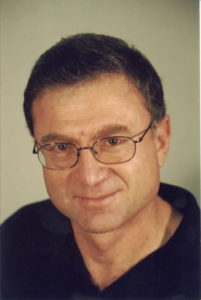 The following great innovative idea is from Ouri Wolfson, the Richard and Loan Hill Professor of Computer Science at the University of Illinois at Chicago, and an Affiliate Professor in the Department of Computer Science at the University of Illinois at Urbana Champaign. Ouri was one of the Blue Sky Award winners at ACM SIGSPATIAL ’18 for his paper called Understanding the Human Brain Via its Spatio-temporal Properties.
The following great innovative idea is from Ouri Wolfson, the Richard and Loan Hill Professor of Computer Science at the University of Illinois at Chicago, and an Affiliate Professor in the Department of Computer Science at the University of Illinois at Urbana Champaign. Ouri was one of the Blue Sky Award winners at ACM SIGSPATIAL ’18 for his paper called Understanding the Human Brain Via its Spatio-temporal Properties.
The Idea
The human brain is probably the most complex object in the universe, and also one of the least understood. For example, how the brain produces the mind and consciousness is a complete mystery. Nevertheless, the brain is amenable to measurements of various kinds that produce lots of data. It is a spatial object residing in the skull; it is also temporal in the sense that neurons communicate by signals that traverse the brain network over time. In this paper we ask whether spatio-temporal data analysis can contribute to its understanding. Toward this goal we propose several research directions that are inspired by GIS work. However, these are just examples, and other work on moving objects in space or on spatial networks is applicable.
Impact
Even for basic brain activities such as sleep there is no consensus concerning its purpose and how the purpose is achieved. Higher level functions such as imagination, creativity, aggressiveness, and more generally consciousness are highly controversial. To some scientists consciousness is in some sense a fundamental (but still mysterious) element, whereas to others it is an emergent property resulting from neural computation and coding. We argue that spatio-temporal data analysis can shed a light on such issues.
The structure and dynamics of the human brain are captured by brain imaging technologies and organized in data structures called the connectome. The connectomics field is in its infancy. Decoding the connectome at the cellular level is a significantly more difficult task than sequencing the human genome, and the field of connectomics is currently at the level of genomics in the 80’s. This presents both challenges and opportunities for the spatio-temporal research community.
Other Research
Rapid urbanization has modernized peoples’ lives but also engendered big issues, such as traffic congestion, energy consumption, and pollution. Urban computing aims to tackle these issues by generating and using city data (e.g., traffic flow, human mobility, and geographical data). Urban computing connects urban sensing, data management, data analytics, and service provision into a recurrent process for an unobtrusive and continuous improvement of peoples’ lives, city operation systems, and the environment. Urban computing is an interdisciplinary field where computer sciences meet conventional city-related fields, like transportation, civil and environmental engineering, economics, ecology, and sociology in the context of urban spaces.
A key element for urban computing is the widespread availability of sensors of different types, which can capture a wide range of environmental conditions and information of the surroundings of the user. Beside traditional wireless sensor networks, where sensors are statically deployed over a fixed area to measure certain values, mobile and urban computing scenarios open up new opportunities for more flexible and dynamic approaches. These approaches are especially promising in the areas of transportation and the environment.
Researcher’s Background
Ouri Wolfson’s main research interests are in database systems, distributed systems, and mobile/pervasive computing. He received his B.A. degree in mathematics, and his Ph.D. degree in computer science from Courant Institute of Mathematical Sciences, New York University. He is currently the Richard and Loan Hill Professor of Computer Science at the University of Illinois at Chicago, and an Affiliate Professor in the Department of Computer Science at the University of Illinois at Urbana Champaign. He is the founder of Mobitrac, a high-tech startup that was acquired by Fluensee Co. in 2006; and the founder and president of Pirouette Software Inc. which specializes in mobile data management. He served as a consultant to Argonne National Laboratory, US Army Research Laboratories, DARPA, and NASA. Before joining the University of Illinois he has been on the computer science faculty at the Technion and Columbia University, and a Member of Technical Staff at Bell Laboratories.
Ouri Wolfson authored over 200 publications, and holds seven patents. He is a Fellow of the Association of Computing Machinery (ACM), a Fellow of the American Association for the Advancement of Science (AAAS), a Fellow of the Institute of Electrical and Electronics Engineers (IEEE), and a University of Illinois Scholar for 2009. He co-authored seven award winning papers, and served as a Distinguished Lecturer for the Association of Computing Machinery during 2001-2003. Ouri Wolfson’s research has been funded by the National Science Foundation (NSF), Air Force Office of Scientific Research (AFOSR), Defense Advanced Research Projects Agency (DARPA), NATO, US Army, NASA, the New York State Science and Technology Foundation, Hughes Research Laboratories, Informix, Accenture, and Hitachi Co. During 2006-2015 he served as the Principal Investigator on a $3.1M NSF grant to establish a Ph.D. program in the new discipline of Computational Transportation Science.
Links
https://www.cs.uic.edu/~wolfson/
To view more Great Innovative Ideas, please click here.









